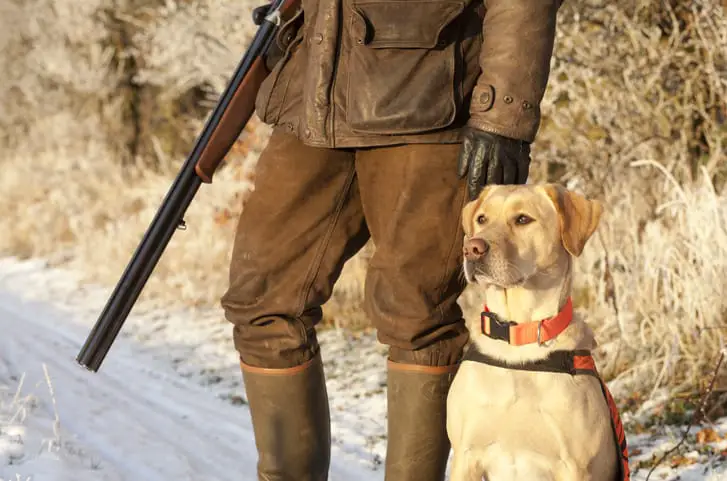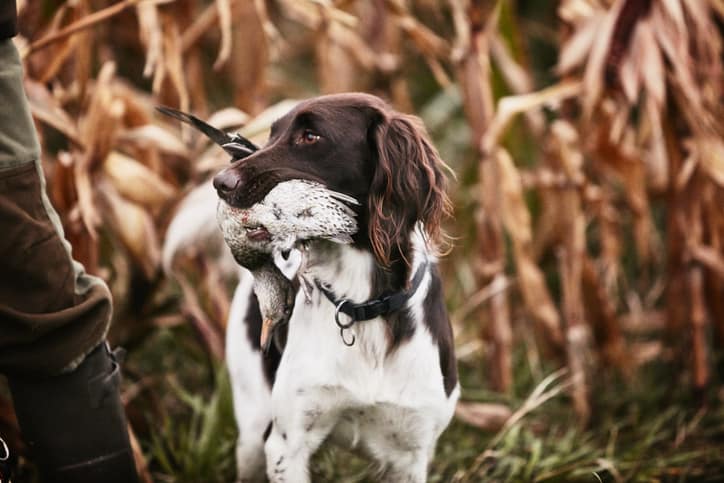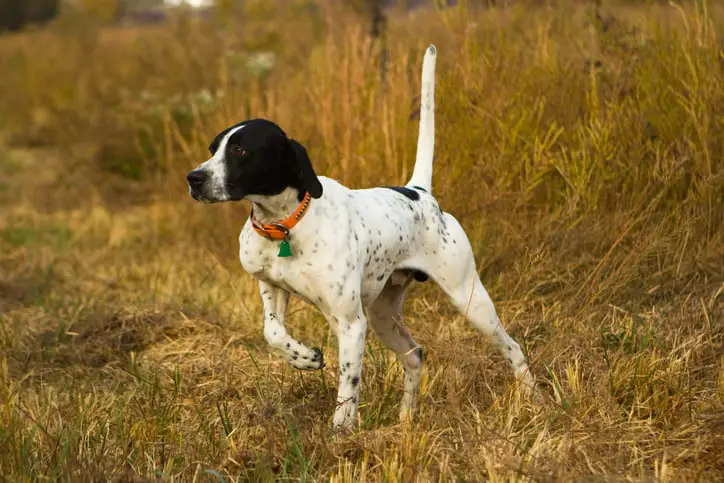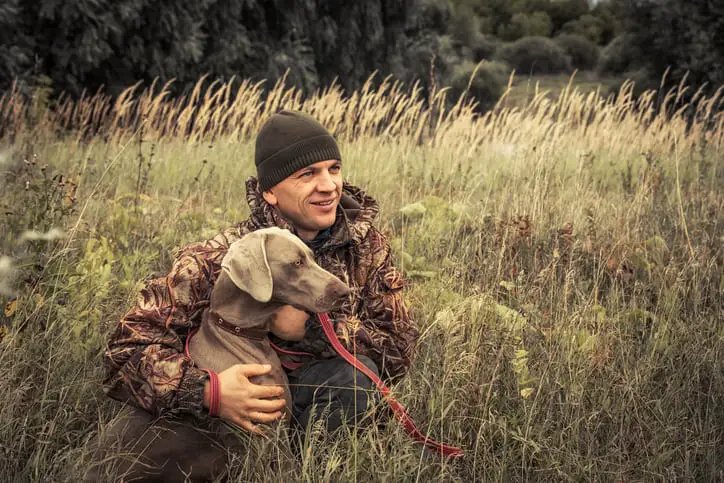Complete Guide To Hunting And Field Trials For Dogs
When most people hear the term “hunting dog”, they tend to associate it with literal hunting. However, many dogs participate in hunting because of their owner’s recognition of their natural instincts, similarly to how most herding dogs today herd livestock competitively to utilize their natural herding instincts rather than actually perform herding work on a farm as their ancestors did.
This article will provide you with the basic information you need to understand about hunting and field trials for dogs if you are considering training your dog for these activities.

Table of Contents
What Are The Different Types Of Hunting and Field Competitions?
There are many hunting events for dogs to participate in. From a low pressure instinct evaluation to higher stakes competitions, there is something for every dog and handler to enjoy in the variety of events held by the American Kennel Club (AKC):
Retriever Hunting Tests
The American Kennel Club (AKC) began conducting hunting tests in 1985 to help dog owners evaluate their dog’s hunting instincts and skills. The test evaluates each dog’s ability to retrieve birds under a variety of conditions.
Hunting Tests are non-competitive and there are three test levels: Junior, Senior, and Master. Dogs either pass or fail each test. Audiences are required to be silent during these tests.
Judges evaluate each dog’s natural instincts to:
- Mark a fall.
- Remember a fall.
- Hunting style.
- Perseverance.
- Courage.
- Perform learned abilities including steadiness, control, response, delivery.
Since hunting tests are not competitive, they tend to have the kindest ambience out of all the hunting events. Handlers tend to be very supportive and encouraging of one another at these events, and they are famous for their applause of one another, which is unparalleled in other hunting events.
Retriever Field Trials
Beginning in the 1920’s, hunters chose to compete against one another to see who’s dog had the best skills. The average competition took place in ranges of distance of approximately 100 yards.
The Retriever Field Trials of today function at a much higher caliber. Modern marked retrieves and blinds are usually longer than 250 to 300 yards.
Only the handlers most dedicated to training make it to these events; dogs must be in optimal physical condition and the handler and dog must work together as a team as effectively as possible to succeed. The dogs must also be in optimal mental condition to succeed; these trials may involve working with multiple marking tests, multiple gun stations and multiple blinds.
This sport challenges dogs both physically and mentally, making training for and participating in these events the perfect way to keep your retriever in good physical condition and to keep them engaged mentally.
Beagle Field Trials
Beagle Field Trials involve the dogs working in packs of a minimum of 2 beagles, or more, following the scent of a rabbit. In these competitions, the dogs are to follow the rabbit, not catch and injure them. The beagles are judged on their abilities to search in a controlled manner, pursue accurately and patiently, their determination and their adaptability.
Although they are one of the smaller breeds involved in hunting trials, these events do not disappoint spectators. In fact, they are extra fun to watch because of how adorable the beagles are!
Spaniel Field Trials
Spaniel Field Trials were designed to be as similar to a day hunting in the field as possible. Judges score dogs on their ability to find game, their control, their scenting ability, their ability to cover ground, their steadiness, perseverance, courage, and their ability to retrieve. Dogs who excel in these competitions take commands well, retrieve efficiently and deliver to their handler’s hand.
Spaniel Field Trials are often enjoyed by spectators not only because of their skills, but also because of their endearing faces and personalities.

Bird Dog Trials
According to Field and Stream, Bird Dog Trials come in two varieties:
In a walking field trial, handlers and dogs are reenacting an actual hunt. The course takes 30 to 45 minutes to complete. Judges observe participants on horseback. When a dog locates and points at one of the course’s planted birds, the handler then flushes the bird and shoots a blank pistol, then the team continues on through the course.
In a shoot-to-retrieve walking trial, the course is smaller but still planted with a set number of birds. Judges ride ATVs through the course to observe the dogs. Two handlers and their dogs work in the field. Dogs locate a bird by pointing, then handlers must flush the bird out and shoot it. Then, the dogs retrieve the birds. Points are awarded when dogs locate and retrieve birds.
Pointing Breed Hunt Tests
Pointing Breed Hunt Tests allow owners and handlers to bond with their dogs because the tests are all about the dog’s individual instincts and there is no pressure to win, as these tests are only pass or fail.
According to the American Kennel Club (AKC), Dogs who pass these tests display “…desire, boldness, independence, speed with a useful pattern of running across difficult or confusing scent patterns to pinpoint the location of birds”.
Judges evaluate each dog’s bird finding ability, pointing ability and trainability. There are two levels of tests: Senior and Master.

Pointing Breed Field Trials
Pointing Breed Field Trials are one of the oldest canine competitions. They got their start in America in 1874, making participating in the sport a way to continue the traditions of your dog’s ancestors, and perhaps yours as well.
The pointers who participate in these events must cover a lot of ground in a little time. Handlers work with their dogs either on foot or on horseback.
According to the American Kennel Club (AKC), Dogs must “…display qualities like their keen desire to hunt, their intelligence, ability to find game, style and courage.” to succeed in these competitions.
The American Kennel Club (AKC) describes the pointing breed dogs who excel in these trials to have the following qualities: “Athleticism. Stamina. Courage. An instinct to go, go, go.”

American Kennel Club (AKC) Gun Dog Championships
The AKC’s Gun Dog Championships were created as a result of efforts to widen the scope of Pointing Breed Field Trials. A newer sport, this event came about in 1993. The event only takes place in the spring and the location rotates annually.
Hunt Tests vs Field Trials: What Is The Difference?
The difference between these events is simple: hunt tests are passed or failed by an individual dog, on a non competitive basis, while field trials award scores against other dogs, awarding a win to the dog who scores the highest.
Hunt tests are great for owners and handlers who are just looking to bond with their dog and evaluate their dog’s natural instincts in a fun, non-competitive way. Owners and handlers who want to compete also should participate in hunt tests as a way to see if their dog could succeed in competitions.
Field trials are ideal for owners who want to use their dog’s natural instinct to strengthen their bond and provide mental stimulation while keeping their dog in good shape, with the added bonus of the bragging rights that come with wins.
Why Should You Participate In Hunt Tests, Field Trials or Bird Dog Trials?
The reasons that owners and handlers choose to participate vary from practical to fun. The top reasons to participate are:
- According to Field and Stream, the time spent with a dog working on hunting training contributes towards a dog trying harder to please his or her owner, which makes them more effective hunting companions.
- Owners and handlers that hunt to feed their families can benefit from the dogs being trained to help hunt. When their dog obtains this experience, competing is a way to use this training in a fun way rather than strictly practical.
- Training for and participating in these events strengthens the bond you have with your dog.
- Training for and participating in these events offers your dog mental stimulation.
- Training for and participating in these events helps keep your dog in good physical condition when done properly.
- The breeds of dogs who were bred for this work genuinely enjoy participating when they are born with the natural instincts needed to succeed, making training for and participating in these events a fun activity for them.
What Do You Need To Get Started In Hunt Tests or Field Trials?
To participate in field trials, you will need the following:
- A purebred dog of an eligible breed that is at least 6 months old and registered with the American Kennel Club (AKC).
- An experienced trainer and access to the appropriate training environment.
- Time to dedicate to training or the ability to pay a trainer to work with your dog for you.
- Good quality training supplies, which can be found at Field Trial and Cabelas.
Who Is Eligible To Participate In Hunt, Field Or Bird Trials?
Though each type of trial has slightly different eligibility requirements, most of them share the following:
- Dogs must be at least 6 months old, or older.
- Dogs must be spayed or neutered.
- Female dogs may be in heat.
- Dogs must be registered with the American Kennel Club (AKC), limited registration is also accepted.
Due to the specific instincts required for hunting and field events, only certain breeds are eligible to participate. Each type of trial has a list of eligible breeds, which I have listed in ABC order rather than by event type, as the overall characteristics of a breed of dog being suitable for your family is more crucial than the type of event they are eligible for when looking to give a dog a forever home:
- American English Coonhound
- Beagle
- Black and Tan Coonhound
- Bluetick Coonhound
- Brittany
- Chesapeake Bay Retrievers
- Cocker Spaniel
- Curly-Coated Retriever
- English Cocker Spaniels
- English Setter
- English Springer Spaniel
- Flat-Coated Retriever
- German Longhaired Pointer
- German Shorthaired Pointer
- German Wirehaired Pointer
- Golden Retriever
- Gordon Setter
- Irish Red & White Setter
- Irish Setter
- Irish Water Spaniel
- Labrador Retriever
- Nova Scotia Duck Tolling Retriever
- Pointer
- Portuguese Pointer
- Redbone Coonhound
- Spinone Italiano
- Slovakian Wirehaired Pointer
- Treeing Walker Coonhound
- Vizsla
- Weimaraner
- Wirehaired Pointing Griffon
- Wirehaired Vizsla
How Do You Find A Dog For Hunting, Field or Bird Trials?
While most dogs have a prey drive, not every dog is suited to succeed in Hunting, Field or Bird Trials. If you want to participate in these activities, you will need to research which breed is best suited for your family’s lifestyle out of the aforementioned breeds who were bred for the job.
The best place to locate a responsible, quality breeder is the American Kennel Club (AKC) Market Place.
When shopping for a puppy, be sure to only support responsible breeders and not puppy mills. If you encounter conditions and care that make you suspect abuse, report it here. Remember, dogs cannot seek help for themselves, so do not hesitate to speak for them!
How Much Do Hunting, Bird and Field Dogs Cost?
Since these dogs are bred carefully, often from parents who have achieved success in competitions, purchasing a qualifying dog is an investment. You should expect to pay $2,000 or more for a puppy of any of the aforementioned breeds.
If you choose to purchase a dog who is already trained, expect to pay much more.
How Do You Get Started In Hunting, Field or Bird Trials?
Training for hunting and field events is a bit more intensive than some other canine sports. To get off to the best possible start, refer to this list:
- Learn terms used by the American Kennel Club (AKC) in their glossary to be able to understand all the material you will review as much as possible.
- Download a copy of the rules and regulations for the type of test or trial you are interested in participating in so that you understand what is expected of you and your dog.
- Find an American Kennel Club (AKC) Training Club or Performance Club near you that offers the type of test or trial you are interested in participating in. Search their calendar for an upcoming event to observe. By observing the event, you will be able to determine if its a good fit for you and your dog.
- Find a seminar near you to attend to learn as much as you can about the type of test or trial you are interested in participating in.
How Do You Train A Dog For Hunting, Field or Bird Trials?
The foundation for success in any canine sporting event is obedience training; be sure to start here.
Since hunting and field events take place in large outdoor spaces, not every owner or handler has access to areas that are similar to where an event would take place. This makes training at home trickier for some.
Locate a American Kennel Club (AKC) Training Club or Performance Club near you to find trainers and facilities that can help you train your dog.
How Long Does It Take To Train Your Dog For Hunting, Field or Bird Trials?
Similarly to humans, all dogs learn at their own pace as they are trained. However, preparing for hunting and field events takes dedication. According to VCA Hospitals, Most owners and or handlers will spend years training and preparing their dogs to compete.
Conclusion
Dogs bred for hunting love to participate in hunting tests, field trials or bird trials because of their natural instincts and their naturally high energy levels. Training for and participating in these events offers a great bonding opportunity for dogs and owners as well.
